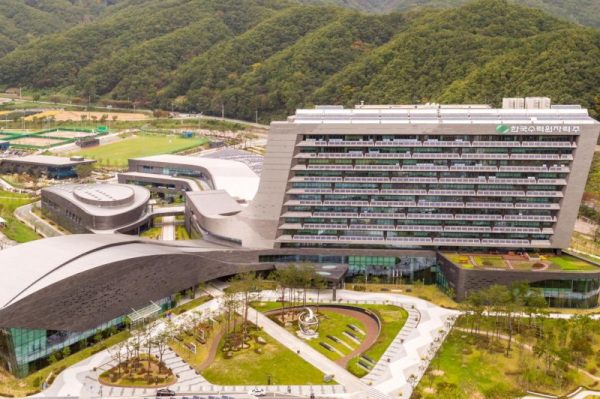

This is the headquarters of Korea Hydro & Nuclear Power, which signed a 50-year deal with Westinghouse Electric Co. LLC of the United States in January, causing nationwide controversy. Photo courtesy of Korea Hydro & Nuclear Power
Controversy has continued in South Korea throughout this week after media reports about the 50-year agreement between state-run Korea Hydro & Nuclear Power, or KHNP, and Westinghouse Electric Co. LLC of the United States.
At first, the contract sparked criticism from the ruling Democratic Party, which asked to scrap the “humiliating slave contract” inked in January under the previous Yoon Suk-yeol administration and renegotiate.
KHNP reportedly agreed to buy $650 million worth of Westinghouse goods and services for every nuclear reactor it exports, in addition to paying $175 million per reactor in licensing fees, during the next half-century.
The long-term deal is also known to contain a provision that gives Westinghouse the right to assess whether Korean companies are technically independent before they can compete for international nuclear projects.
In addition, KHNP will be banned from pursuing nuclear projects in North America, Britain, Japan, Ukraine and the European Union, with the exception of the Czech Republic, with which KHNP signed an $18.6-billion contract in June to build two nuclear reactors.
The Democratic Party suspected that KHNP struck the “one-sided settlement” with Westinghouse to finish its long-running disputes over nuclear technology rights, a prerequisite to win the Czech export deal.
“We will push for a full parliamentary review of this secret agreement,” the party said in a statement Tuesday. “We will also hold accountable the government officials who committed perjury in the National Assembly by repeatedly hiding the agreement and giving false answers.”
In response, Industry Minister Kim Jung-kwan told lawmakers that the contract in question was a proper one. KHNP CEO Whang Joo-ho said that the Czech nuclear business would still be profitable. Yet, the Democratic Party stood firm against it.
The atmosphere showed signs of changing after reports that KHNP was talking with Westinghouse about forming a joint venture, with the goal of entering the U.S. nuclear market, which KHNP acknowledged.
If the two corporations cooperate in the U.S. market, their 50-year agreement may not be a burden for KHNP, but rather an invitation to a rapidly expanding market, according to observers.
U.S. President Donald Trump has pledged to quadruple U.S. nuclear energy capacity by 2050, which would require hundreds of new reactors over the next 25 years. In particular, he vowed to start construction of 10 nuclear reactors by 2030.
“Westinghouse has source technologies and KHNP retains capabilities in building nuclear reactors based on South Korea’s outstanding supply chain. The alliance of the two sides will be a win-win solution,” Korea Advanced Institute of Science and Technology nuclear and quantum engineering professor Choi Sung-min told UPI.
“We are required to see opportunities in the contract with Westinghouse instead of trying to cancel it and renegotiate. The two parties will also be able to collaborate in other overseas markets outside of the U.S.,” he added.
The Korean government denied expectations that the KHNP-Westinghouse joint venture would be included in the agenda of Monday’s summit between President Lee Jae Myung and his U.S. counterpart Trump.
However, Choi projected that the meeting would accelerate nuclear partnership between the two countries. Lee will be accompanied by KHNP CEO Whang for his U.S. visit.
Nuclear engineering Professor Chung Bum-jin from Kyung Hee University said that the bilateral agreement was not balanced in terms of the long period and technological assessment from Westinghouse. However, he said that it was a decision of KHNP.
“To conclude the Czech deal, it seems that KHNP opted to accept somewhat unfair clauses. However, it is undesirable and even impossible to terminate it for renegotiation,” Chung said in a phone interview.
“The U.S. would not be able to begin construction of 10 nuclear reactors in five years without the help of Korean contractors and suppliers. KHNP and Korean companies had better take advantage of the chances,” he said.